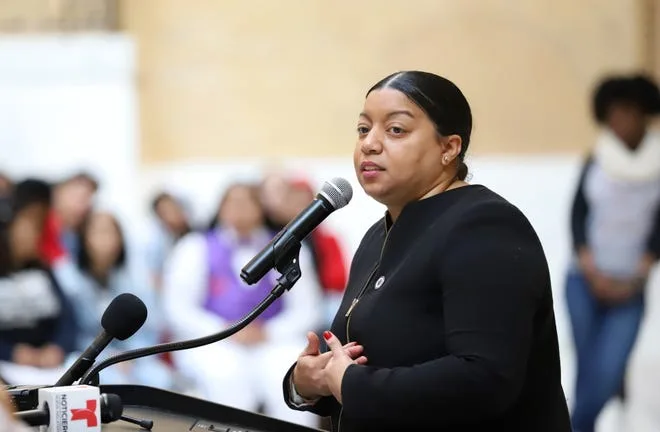
BOSTON ― Even as her bill to form a commission to explore a blueprint for reparations to the descendants of the slave trade in Massachusetts raises eyebrows, Sen. Liz Miranda says the state must acknowledge and apologize for the harm caused by slavery and address the ripple effects still affecting lives 400 years later.
“Senator Bill Owens, the first Black man elected to the Massachusetts Senate, was the first to champion this work,” Miranda told the Joint Committee on the Judiciary at an hours-long hearing Tuesday. Hers was one of dozens of bills heard by the committee, many of them dealing with attempts to address racial and gender discrimination.
Owens served in the state House of Representatives from 1973 to 1975 and was elected to the Senate in 1974. Owens, who advocated for gun control measures and was instrumental in the formation of Summer Youth Jobs Program, died last year after a bout with COVID-19 at the age of 84. He sponsored a bill during his tenure that would have required the state government to pay reparations to the descendants of former slaves living in Massachusetts.
15-member commission would study Massachusetts’ involvement in slave trade
In her bill, Miranda proposes a 15-member commission to study the impact and history of slavery in Massachusetts and to formulate recommendations on reparative actions. She discussed the building of the slave ship Desire, the state’s institutionalization of slavery in 1641 and its participation in the slave trade and the Caribbean sugar and rum trade.
“I was a senior in Boston before I had my first Black history class,” Miranda said. That it is when, she said, she learned about former Massachusetts slaves like Belinda Sutton, who successfully petitioned for freedom; and about that relic of the British Empire, the Shirley-Eustis House, just blocks from her Roxbury home, where enslaved children and adults slept in the stables, deemed unfit to be inside the main house.
“The march of Black history has been kept secret on the local, state and federal level,” Miranda said.
While Massachusetts was the first to abolish slavery, Miranda said structural inequity and racism have created lingering disparities for descendants of the formerly enslaved.
“These are all byproducts of slavery,” Miranda said.
Marlin Solomon, founder and senior project engineer at the nonprofit Afrimerican Academy, cited a 27-year life expectancy gap between residents of Roxbury and Beacon Hill.
“Unless the infrastructure is addressed, we cannot move forward,” Solomon said, pointing to the practices of red-lining and urban renewal. The progress of Black emancipation was thwarted, Solomon said, by the demolition of Black communities in Boston to make way for the construction of the Southeast Expressway. “These were not just Black spaces, but the soul of the community.”
The bill received support at the committee hearing from African-American descendants of slaves and coalitions formed by religious and grass-roots advocacy groups.
Commission would ‘lead the way’ for the U.S. and other states
“This is a historic opportunity for Massachusetts to take steps to collectively explore reparations for descendants of slavery,” said Heather Cook, a South End mother, investment field employee and community organizer.
Community organizer Edwin Sumpter reiterated Owens’ call for reparations, made 50 years prior.
“It’s not just about us. It’s about our children and children’s children — Black and white. We need to narrow the (wealth) gap now to affect the generations down the road,” Sumpter said. “We can’t wait another 50 years.”
While advocates pushed for the creation of the commission, they recognized that payments may be out of the scope of the Massachusetts state government. Many suggested the commission’s work could serve as a roadmap for the rest of the United States and said it is the federal government’s responsibility to right the injustices perpetrated, carried out and tolerated by the United States.
“It was the failure of the American government to protect the descendants of slavery. It allowed the issues to persist,” said Michaela Bembery, a Framingham resident.
Churches weigh in on debate
A group of pastors from diverse churches in and around the Greater Boston area also weighed in on the bill, pointing out that their congregations have been grappling with their own historical involvement with slavery.
Arrington Chambliss, of the Episcopal City Mission in Boston, said the study commission is necessary to “heal the soul of the commonwealth and the U.S.”
At the latest state convention of the Episcopal diocese, a meeting of more than 500 clergy and lay ministers, the group voted overwhelmingly to create its own reparations fund to atone for the church’s involvement in the slave trade.
“Our goal is $11.1 million. It’s not enough, but it’s a start,” Chambliss said.


